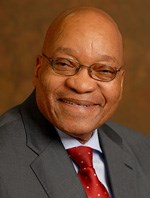
Top stories






More news


















Logistics & Transport
Uganda plans new rail link to Tanzania for mineral export boost










Speaking at the Leaders' Working Dinner at the Nuclear Security Summit in Seoul, South Korea, on Monday, Zuma warned against complacency.
"We should remain vigilant of the continued risks posed by nuclear terrorism, the illicit nuclear network and criminal acts, and the use of nuclear or other radioactive material for malicious acts.
"We can, through a co-operative approach in the relevant multilateral organisations, effectively deal with these risks," he said.
Zuma noted that leaders were meeting at the summit with the common objective to achieve a world free of weapons of mass destruction, and in particular nuclear weapons.
"In our desire to create a forum to raise awareness on nuclear security; we cannot ignore the reality that only the verifiable and irreversible elimination of nuclear weapons will ultimately prevent the use of such weapons," he added.
Zuma also noted the necessity to fully implement relevant international legally binding obligations on nuclear security and nuclear safety.
Such an approach proved invaluable when South Africa hosted the 2010 FIFA Soccer World Cup.
"Let me take this opportunity to thank the International Atomic Energy Agency (IAEA) and the Government of the United States of America for their assistance in facilitating the implementation of nuclear security measures at the different World Cup venues, thereby contributing to its great success," he said.
On the issue of highly enriched uranium (HEU), Zuma acknowledged that HEU and separated plutonium required special precautions, adding that South Africa had taken such precautions.
"Our international legally binding obligations on nuclear disarmament and nuclear non-proliferation allow for the enrichment of uranium for peaceful purposes only, irrespective of the enrichment level. In this connection, South Africa has adopted a policy on the beneficiation of our mineral resources, including uranium."
South Africa believes that the focus on minimising the use of HEU in peaceful applications, which represents a tiny fraction of HEU used for military purposes, should come to fruition in the long outstanding negotiations on a fissile material treaty, he added.
These negotiations should commence in the Conference on Disarmament without further delay.
"Going forward, we believe that the best approach would be to address the issues of nuclear safety and nuclear security in a coherent manner. Therefore, our future emphasis should be on supporting the work on nuclear safety and security undertaken by existing multilateral organizations such as the IAEA," he said.
MAD: Mutual Assured Destruction, or mutually assured destruction (MAD), is a doctrine of military strategy and national security policy in which a full-scale use of high-yield weapons of mass destruction by two opposing sides would effectively result in the complete, utter and irrevocable annihilation of both the attacker and the defender. Thus, such a war would be one that has no victory nor any armistice but only effective reciprocal destruction. It is based on the theory of deterrence according to which the deployment, and implicit menace of use, of strong weapons is essential to threaten the enemy in order to prevent the use by said-enemy of the same weapons against oneself. (Source: Wikimedia Commons)
SAnews.gov.za is a South African government news service, published by the Government Communication and Information System (GCIS). SAnews.gov.za (formerly BuaNews) was established to provide quick and easy access to articles and feature stories aimed at keeping the public informed about the implementation of government mandates.
Go to: http://www.sanews.gov.za